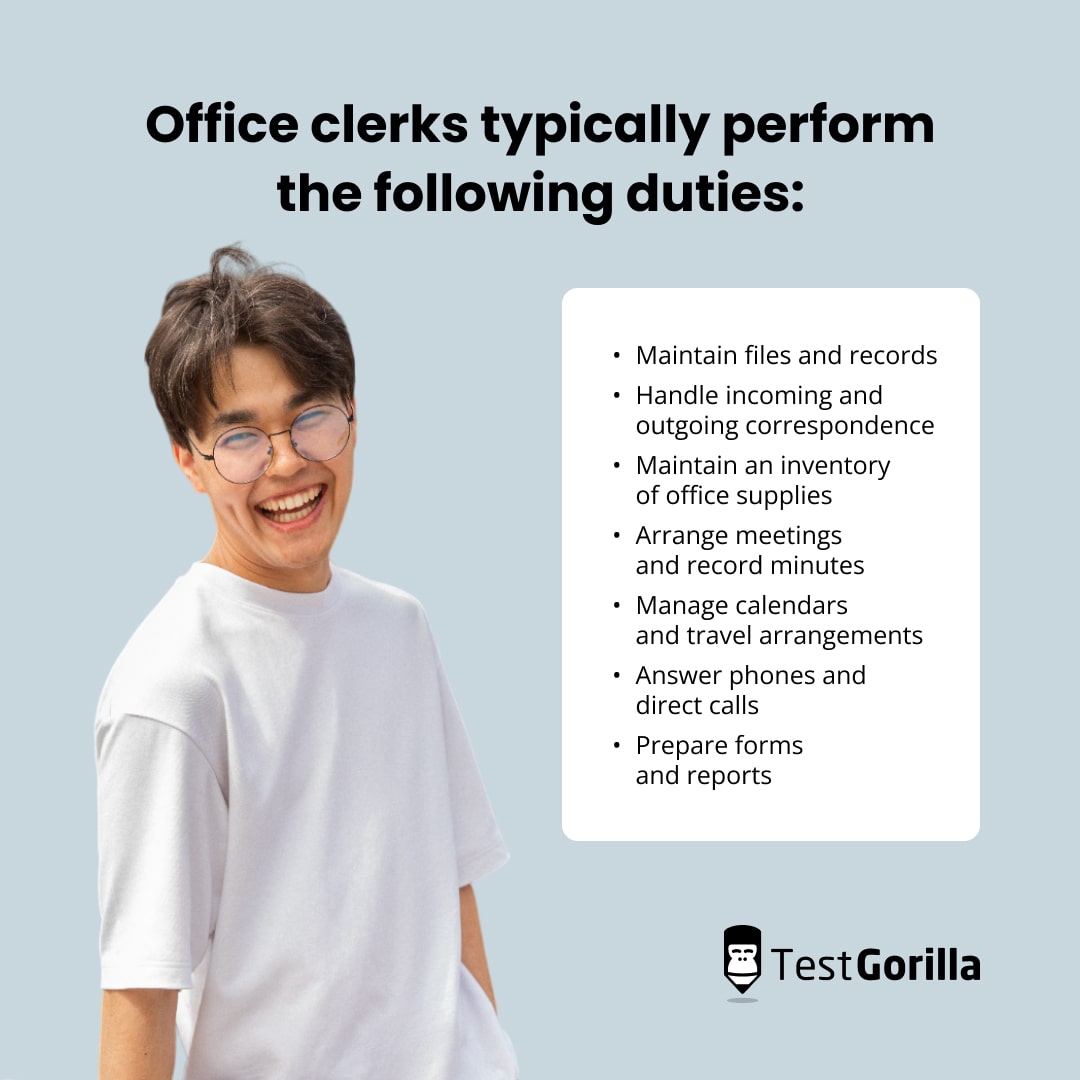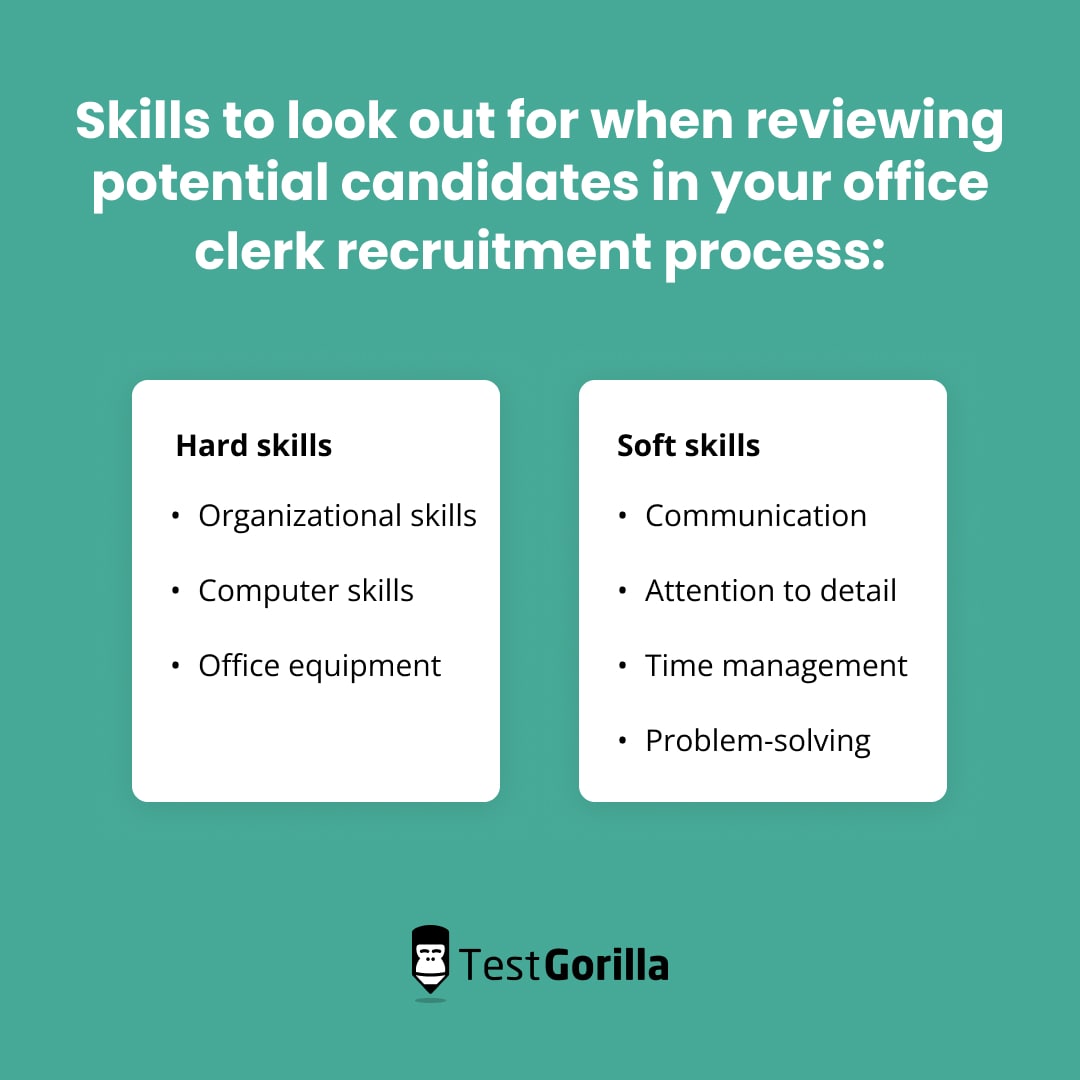As the title of their role suggests, office clerks oversee a company’s clerical activities. An office clerk does more than just prepare documents, schedule meetings, and answer phones – they support overall business efficiency.
This means office clerks must have strong organizational skills, attention to detail, a solid work ethic, an ability to think strategically, and a team mentality to ensure day-to-day business activities run smoothly.
If you have been tasked with hiring an office clerk and aren’t sure where to start, you’ve come to the right place.
We’ve compiled a helpful guide on how to hire an office clerk to help you easily navigate the office clerk hiring process. It outlines which skills to look out for, how to test for them using our handy screening tests, how to write a compelling job description, recommended salaries, and a few suggested interview questions.
Table of contents
- What is an office clerk?
- Office clerk hard skills
- Office clerk soft skills
- How to test office clerking skills
- Where to find office clerks
- Office clerk job description template
- What is an office clerk’s salary?
- Office clerk interview questions
- Use pre-employment testing to find top office clerks for your organization
What is an office clerk?
An office clerk works behind the scenes to keep an organization running smoothly.
Although the role can vary widely depending on what a company needs, office clerks typically perform the following duties:
Maintain files and records
Handle incoming and outgoing correspondence
Maintain an inventory of office supplies
Arrange meetings and record minutes
Manage calendars and travel arrangements
Answer phones and direct calls
Prepare forms and reports
Also known as office assistants or receptionists, these professionals work in small to medium-sized firms, government, schools, and healthcare facilities.
Office clerk hard skills
Hard skills are specific abilities gained through education and work experience. We’ve noted a few below for you to look out for when reviewing potential candidates in your office clerk recruitment process:
Organizational skills: Having essential organizational skills is crucial to an office clerk’s role. Great candidates can plan their time and resources well and efficiently manage their workload.
Computer skills: Office clerks need to be able to use computers effectively. They must be familiar with office software like calendar and scheduling, word processing, email, and desktop publishing applications. They also need to be adept at data entry.
Office equipment: Office clerks should be comfortable using various office equipment since their role requires that they frequently use and sometimes maintain business machines like copiers and scanners, printers, projectors, internet and telephones, and recycling equipment, to name a few.
The best insights on HR and recruitment, delivered to your inbox.
Biweekly updates. No spam. Unsubscribe any time.
Office clerk soft skills
Soft skills are personality traits, behaviors, and interpersonal skills we use to interact. They define how well someone can work with others. During the office clerk hiring process, look for candidates with the following soft skills:
Communication: An office clerk must be an excellent verbal and written communicator. They need to communicate clearly in a friendly and professional manner with customers, vendors, and other staff members.
Attention to detail: Most clerical tasks require attention to detail. Competent office clerks can do their jobs accurately and without error because they are detail-oriented.
Time management: Office clerks are often involved with multiple tasks at any given time. Therefore, they need to be able to use their time management skills to ensure that none of these tasks fall through the cracks.
Problem-solving: Being an office clerk means troubleshooting and solving problems on the spot. This means you should look for someone who can find solutions calmly and critically.
How to test office clerking skills
Now that you have a suggested set of skills, you can quickly and easily screen potential candidates online using a bias-free skills-testing approach.
By incorporating pre-employment skills testing into your office clerk recruitment process, you can narrow down which candidates are best suited to the role you are hiring for quickly and at a low cost.
For example, here are a few tests you can use to assess the skills of a potential office clerk. However, there are many more available in our comprehensive test library for you to choose from.
Administrative Assistant test: Though they are different roles, administrative assistants and office clerks share many skills, including communication, attention to detail, time management, and problem-solving. This test covers these skills to evaluate a candidate’s ability to support your business.
Culture Add test: This test assesses how a candidate’s values and behaviors align with your organization’s values and the behaviors that would make your ideal hire successful in a specific role based on a customized survey you fill out.
Email Skills (Microsoft Outlook) test: This test enables you to quickly assess a candidate’s ability to work with Microsoft Outlook in a business context using the Microsoft Office suite. It also helps you determine if they understand proper email etiquette, basic email processes, and scheduling.
Microsoft Windows test: You can use this test in your office clerk recruitment process to evaluate a candidate’s understanding and application of basic concepts in Windows. In addition, it helps you hire candidates who are comfortable working in Windows as the software framework for the Microsoft Office suite.
Communication test: Although communication skills are touched on in the Administrative Assistant test, the ability to communicate clearly and professionally can’t be overemphasized. Statistics show that teams that communicate effectively have 25% higher productivity. Adding this test to your assessment will enable you to screen for candidates with excellent workplace communication skills.
Where to find office clerks
Before looking for potential job candidates, determine whether you need someone in-house or on a contract basis.
In-house office clerk
Full-time employees offer a company higher productivity rates, consistency with workloads, and more robust employee loyalty.
However, a full-time employee comes with added costs, like paid leave, medical and other insurance, and performance bonuses. So you’ll need to determine if your workload justifies the additional costs you’ll need to cover and whether these costs are within budget.
Freelance office clerk
When hiring an in-house office clerk isn’t possible or feasible, you could consider outsourcing to a freelance office clerk. For example, you may only need someone for a set period during a particular project, or you might want to bring in an assistant who can handle some overflow without needing to be there full-time.
The cost of independent office clerks is usually less than that of a full-time employee because you don’t need to supply a workstation, offer company benefits like insurance and leave, or cover medical and other overhead costs.
In addition, they are usually specialists in their fields and can fulfill their duties without supervision. But, on the downside, they may not be as dedicated or have the same business insights as a full-time office clerk.
Office clerk job description template
Your office clerk job description will vary based on what your business is looking for, but the recipe for a clear and compelling job description remains the same. Use a clear job title to attract the right people, speak to your candidates directly, describe duties and responsibilities succinctly, and sell your company.
Below is a job description template you can use as a starting point in your office clerk hiring process:
Job title
Be direct and to the point. For example, “rockstar office clerk” is unrealistic and potentially discriminatory. Instead, simply use “office clerk.”
Reports to
State the reporting line in one short sentence. Most office clerks report to office managers, but this may differ depending on the nature and size of the business.
Brief overview
Give a brief synopsis of the company and the role you are hiring for.
Duties and responsibilities
List these in order of importance using concise and complete sentences beginning with a verb. Always use gender-neutral language, and steer away from using jargon or wordy sentences.
Required and preferred qualifications
List required and then preferred qualifications. Entry-level office clerks are expected to have a high school diploma or equivalent. However, some hiring managers prefer candidates with a post-secondary certificate or college credits in a relevant field, such as data entry or business administration.
Benefits
Candidates need compelling reasons to leave their current workplaces or choose your job over others.
Benefits can motivate them to apply for your open role: 55% of employees would be at least somewhat likely to take a position with lower compensation but a better benefits package. Therefore, you should make sure to describe the benefits and perks that come with the job.
What is an office clerk’s salary?
An office clerk typically earns around $35,253 annually. However, office clerks’ salaries range from $17,500 to $45,000 depending on their experience, their qualifications, and the city they work in.
Office clerk interview questions
Below is a list of general office clerk interview questions you could add to the standard questions you typically ask candidates.
What do you consider to be the essential qualities for this clerical job?
Which computer programs and software are you comfortable using?
What is your typing speed and error rate?
If you were given two high-priority tasks from different managers, how would you decide what to handle first?
Are you comfortable handling sensitive information?
What role does an office clerk play in corporate culture?
Do you prefer working independently or as a team member?
How do you see yourself growing in this role?
What would you do if you didn’t get along with someone in the office?
Aside from your primary duties, what other duties have you performed as an office clerk that went above and beyond what was expected of you?
Use pre-employment testing to find top office clerks for your organization
Office clerks are essential to a company’s success. They oversee day-to-day business tasks to ensure everything runs smoothly, giving top executives and management time to focus on the task at hand.
Office clerk recruitment is easy with TestGorilla’s pre-employment skills-testing portal, an unbiased and stress-free way to recruit top talent without fuss. Head over to our signup page to choose a plan that suits your hiring needs. If you have any questions or want to know more about how our platform works, sign up for your free 30-minute live demo.
You've scrolled this far
Why not try TestGorilla for free, and see what happens when you put skills first.




















